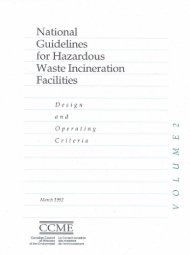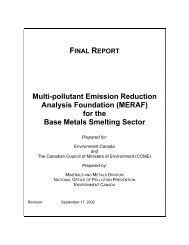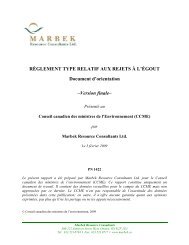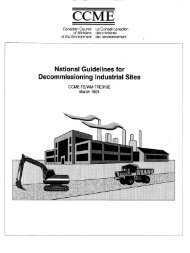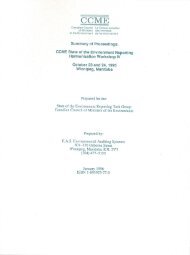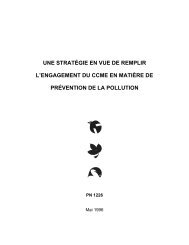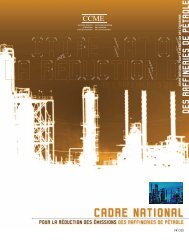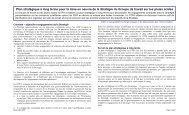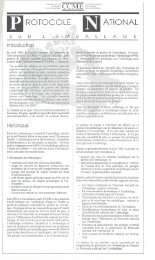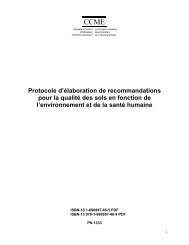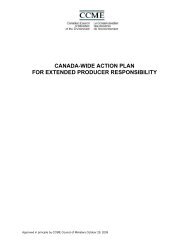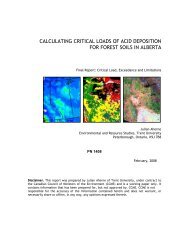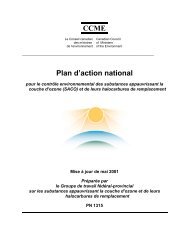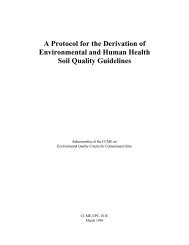Canada-wide Strategy for the Management of Municipal ... - CCME
Canada-wide Strategy for the Management of Municipal ... - CCME
Canada-wide Strategy for the Management of Municipal ... - CCME
You also want an ePaper? Increase the reach of your titles
YUMPU automatically turns print PDFs into web optimized ePapers that Google loves.
<strong>Canada</strong>-<strong>wide</strong> <strong>Strategy</strong> <strong>for</strong> <strong>the</strong> <strong>Management</strong> <strong>of</strong> <strong>Municipal</strong> Wastewater Effluent<br />
coordinating committee will also consider how to treat incorporated versus unincorporated small and<br />
declining communities in <strong>the</strong> development and implementation <strong>of</strong> <strong>the</strong>se alternatives.<br />
Considerations <strong>for</strong> <strong>Canada</strong>’s Far North<br />
Due to <strong>the</strong> extreme climatic conditions and remoteness <strong>of</strong> <strong>Canada</strong>’s Far North, a viable means to improve<br />
human and environmental health protection needs to be carefully considered. There<strong>for</strong>e, a window <strong>of</strong> up<br />
to five years is provided to undertake research into factors that affect per<strong>for</strong>mance <strong>of</strong> wastewater facilities<br />
in nor<strong>the</strong>rn conditions. During this period <strong>of</strong> time, <strong>the</strong> governments <strong>of</strong> <strong>the</strong> Northwest Territories,<br />
Nunavut, Quebec, Newfoundland and Labrador and <strong>the</strong> federal government will work collaboratively to:<br />
• assess <strong>the</strong> per<strong>for</strong>mance <strong>of</strong> existing wastewater facilities and factors affecting <strong>the</strong>se;<br />
• develop nor<strong>the</strong>rn per<strong>for</strong>mance standards;<br />
• develop initial risk level criteria and timelines <strong>for</strong> implementation <strong>of</strong> nor<strong>the</strong>rn per<strong>for</strong>mance standards<br />
with due consideration <strong>of</strong> <strong>the</strong> economic implications in <strong>the</strong> short, medium and long-term;<br />
• adapt <strong>the</strong> environmental risk assessment approach as appropriate <strong>for</strong> <strong>the</strong> Far North; and<br />
• adapt monitoring and reporting requirements.<br />
The following interim measures <strong>for</strong> <strong>Canada</strong>’s Far North wastewater facilities will apply:<br />
• effluent quality requirements in existing authorizations will continue to apply; and<br />
• <strong>for</strong> compliance, monitoring and reporting requirements referenced in current authorizations will be<br />
retained.<br />
Science and Research<br />
Currently in <strong>Canada</strong>, a significant amount <strong>of</strong> research is being conducted on municipal wastewater<br />
effluent issues. To promote coordinated research and disseminate in<strong>for</strong>mation within <strong>the</strong> municipal<br />
wastewater effluent sector, a committee is needed. Such a committee would track who is researching<br />
what, what has already been done and what <strong>the</strong> key research priorities should be in <strong>the</strong> future. For<br />
instance, persistent organic pollutants, bioaccumulative substances, pharmaceuticals and personal care<br />
products are introduced into source water through wastewater discharges <strong>of</strong> wastewater effluent.<br />
Scientific research has been undertaken to link <strong>the</strong>se substances with human health or environmental<br />
effects. There is a need to fur<strong>the</strong>r investigate <strong>the</strong>se compounds, <strong>the</strong>ir cumulative impacts, anti-biotic<br />
resistance and <strong>the</strong> different treatment types including source control. Similarly, research into <strong>the</strong><br />
per<strong>for</strong>mance <strong>of</strong> existing nor<strong>the</strong>rn wastewater facilities and environmental factors affecting <strong>the</strong>se will help<br />
to identify potential improvements or modifications to treatment processes. The proposed committee<br />
would publicize projects and results to prevent duplication and to promote collaboration among<br />
researchers. It would nei<strong>the</strong>r conduct nor fund research.<br />
Review<br />
<strong>CCME</strong> will regularly assess progress on <strong>the</strong> implementation <strong>of</strong> <strong>the</strong> <strong>Strategy</strong> to determine whe<strong>the</strong>r<br />
revisions are needed to <strong>the</strong> <strong>Strategy</strong>. At a minimum, <strong>the</strong> assessment will include a review <strong>of</strong> economic<br />
issues, develop a policy and process on environmental monitoring, integrate <strong>the</strong> research completed <strong>for</strong><br />
<strong>Canada</strong>’s Far North and examine <strong>the</strong> latest science, especially on emerging substances associated with<br />
municipal wastewater effluent.<br />
Reporting on Progress<br />
Jurisdictions will regularly report progress towards meeting <strong>the</strong> requirements <strong>of</strong> <strong>the</strong> <strong>Strategy</strong> to<br />
<strong>CCME</strong> Ministers and Canadians.<br />
Endorsed by <strong>CCME</strong> Council <strong>of</strong> Ministers, February 17, 2009, Whitehorse Page 9



